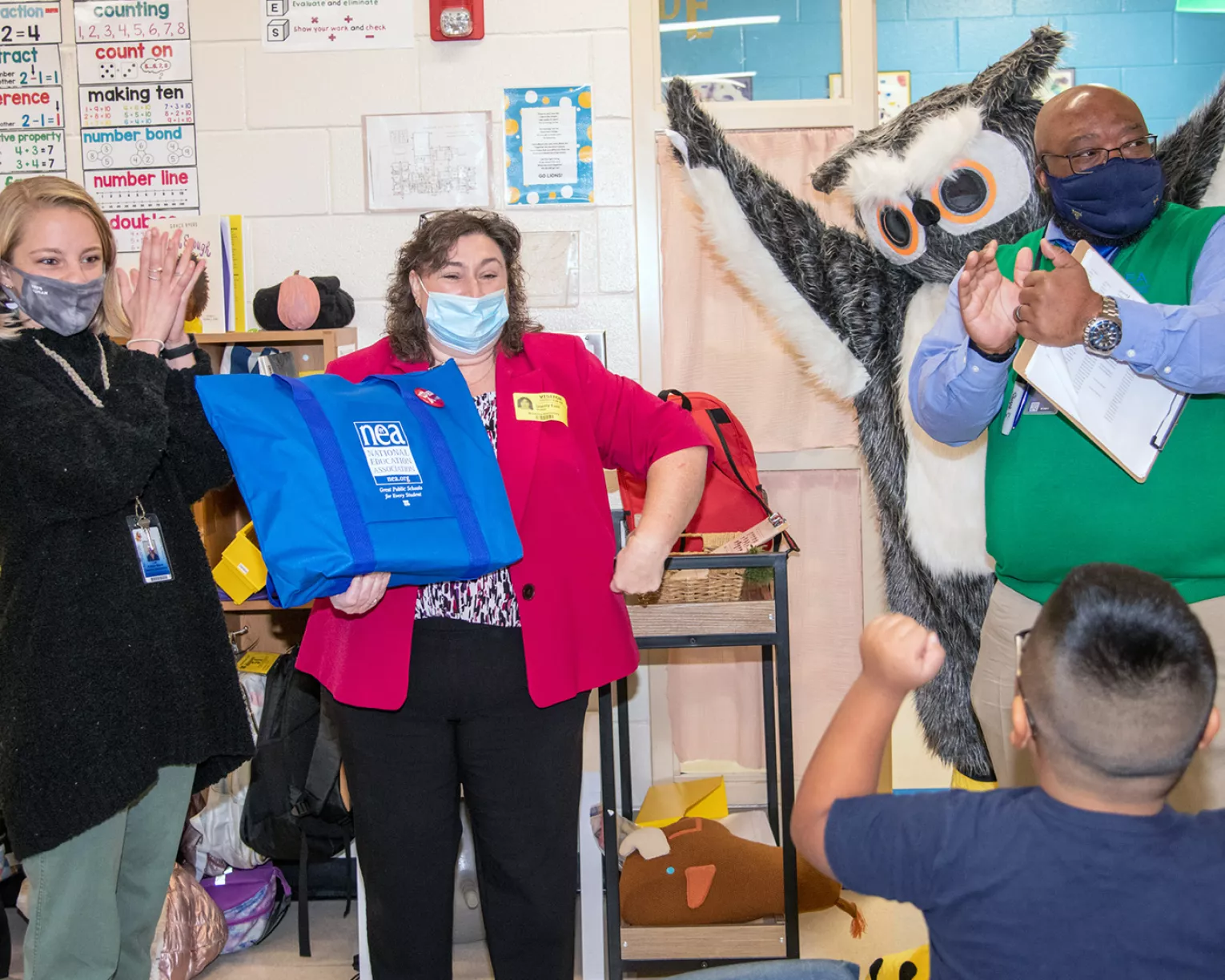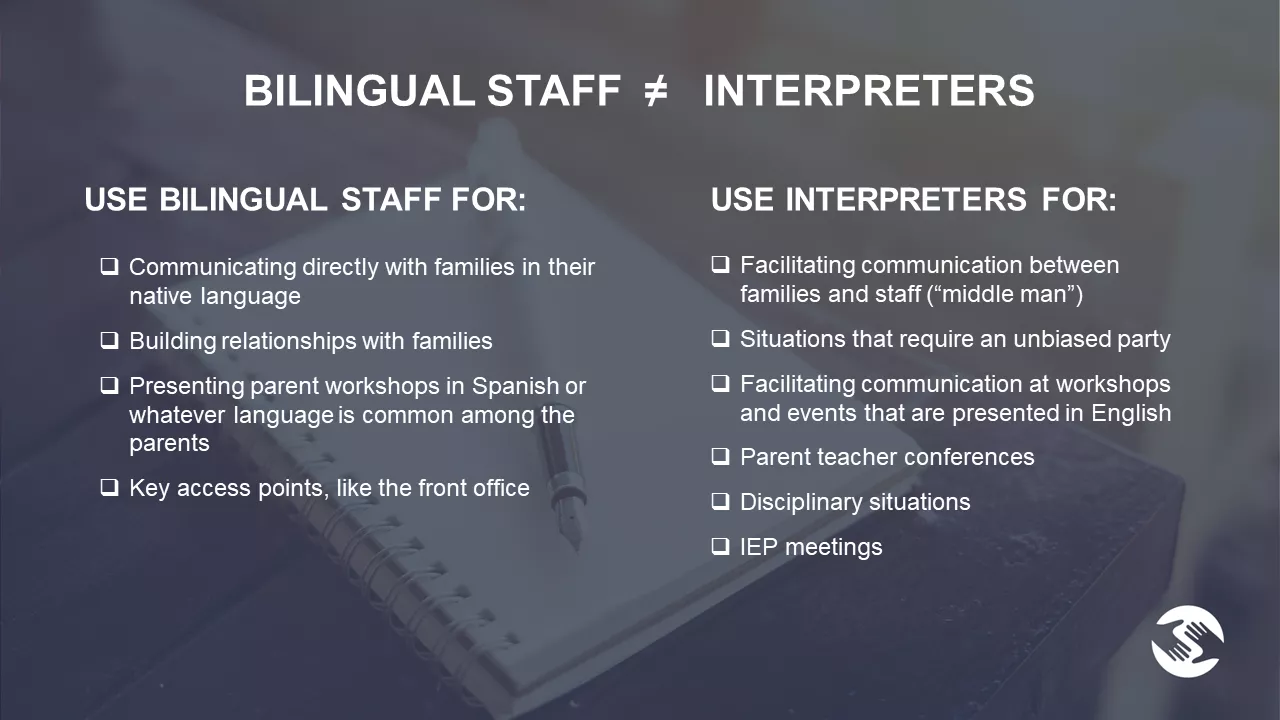What language access looks like
Prince George's County Public Schools, MD
Prince George's County Public Schools (PGCPS) in Maryland, has been a leader in the development and execution of a robust language access program. Acknowledging the critical nature of language access for families decades ago, interpreting and translation services were initiated in the district in 1993. PGCPS recognized language access as a central issue of equity, and the school district created an Office of Interpreting and Translation (OIT) in 2010, built from the ground up.
Today, the OIT provides language access resources in a diverse school district of more than 60,000 international families. The PGCPS Interpreter Bank has more than 100 on-call interpreters (oral) representing over 20 languages and a team of six translators (written) supporting systemic and school-based translations, including the district website and language-specific social media. The district fills more than 18,000 interpreting requests annually. Dr. Jennifer Love notes, "When we know how language access resources should be organized and implemented for effective communication, we have a responsibility to our families and our school communities to get it right."
Brockton Public Schools, MA
Brockton Public Schools in Massachusetts serves a large population of English language learners (ELLs) who speak many languages, including Cape Verdean, Portuguese, Haitian Creole, Spanish, Chinese, and Karen. The district has built a robust infrastructure of multilingual support for its families — so much so, that the main registrar's office in the school district central office is right next to the office of the Director of Bilingual Education, Kellie Jones. This ensures that families can get support in their language from the moment they walk in the door. While many staff members throughout the district are bilingual, including teachers, paraprofessionals, school nurses, and counselors, the district has also ensured that interpreters have appropriate levels of training.
Ms. Jones notes, "We work to make sure that all staff for whom translation is part of their job responsibilities have a certificate to do so. All of our 11 Bilingual Community Facilitators and 3 Parent Advocates have undergone 30-hour course training on Interpretation and Translation. We also currently have two paraprofessionals going through training with UMass-Amherst."
This multilingual network, which has survived some tough statewide budget cuts due to a fiscal commitment from district leaders, has been able to support families through COVID-19 in critical ways. As Superintendent Michael Thomas noted, "It was more important than ever to make sure that parents were receiving information in real time in their native language. And you couldn't have a delay in that, because that meant that people weren't going to eat and people weren't going to get the benefits that they were entitled to."
To see more about Brockton's multilingual COVID-19 response, see "Proactively Building a Rapid Response Team" by Dr. Debbie Zacarian.
Salina Elementary, MI
The staff at Salina Elementary School in Dearborn, Michigan serve a large population of families from Yemen. Many of the staff throughout the building are bilingual. One of the key staff members in partnering with families is parent liaison Sana Hamad, who does both written translation and spoken interpretation. She notes, "It's so important to provide parents with someone who speaks their language because we want them to understand what's going on. We want them to feel comfortable coming to school and to find someone who speaks their language...We want them to feel (they are) coming to another home." You can see the staff of Salina Elementary in action in the Colorín Colorado documentary You Are Welcome Here.
Wolfe Street Academy, MD
Sometimes, ensuring that families have language access takes additional detective work and legwork. At Wolfe Street Academy, in Baltimore, MD, the staff at the school noticed an uptick in special education referrals for their Spanish-speaking students, even though the assessments were conducted in Spanish. After some investigation, they realized that many of these students actually spoke Mixtec, an indigenous language from Mexico, as a first language and Spanish as a second language.
Since there is a stigma around speaking Mixtec, the families mainly operated in Spanish and never mentioned their Mixtecan language to the school staff. Once staff made this discovery, they learned a lot about the Mixtec and the dialects their families spoke, found more resources to support language access, and worked on creating a more positive culture around the language at the school to lessen the stigma. The school has made great progress; yet even now, when new families enroll at the school, many families who speak Mixtec don't indicate that they do when initially asked.



